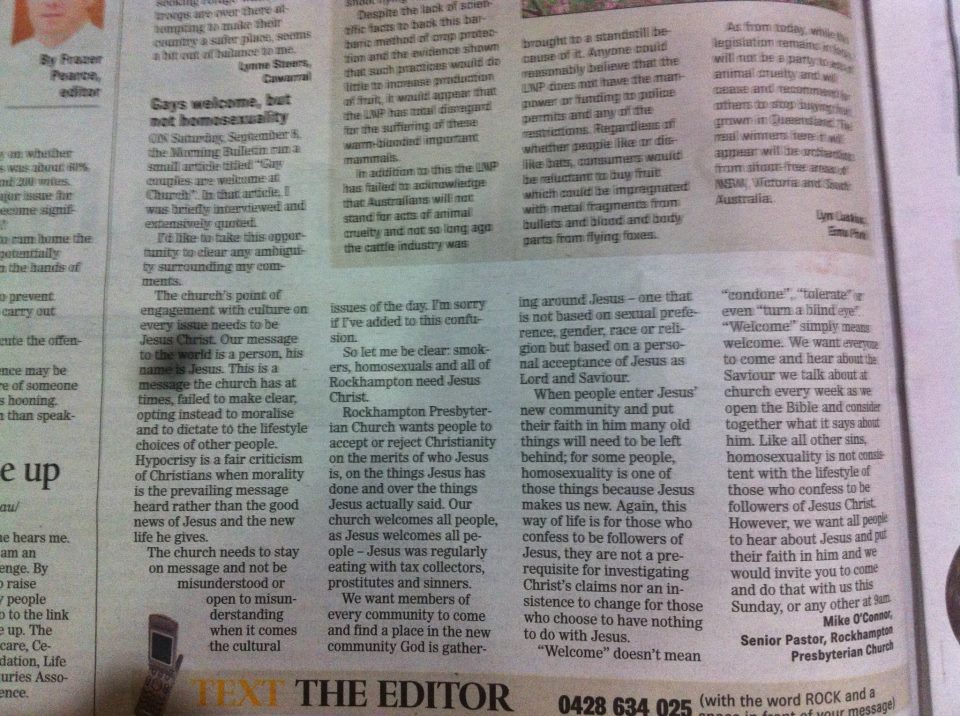Church Communication is something I’m pretty keen on. So a book on Church Communication, with contributors from churches all around the world, is something I’m also pretty keen on.
Enter Outspoken: Conversations on Church Communication a nice little primer on church communications in the digital age.
What I liked about this book is how digestible the chunks are. Each chapter is an idea. A page or two – basically a blog post. From a different person. Each chapter ends with contact details for that person. It’s very conversational. It’s a nice format – and this is, increasingly, the way this sort of “how to” book is going to work, I think.
I loved that each contributor is passionate about seeing the church communicate its message well, and in a way that removes barriers for people while finding new opportunities. There’s much to like here. And not much to dislike. You should get a copy.
Some chapters resonated more with me than others, each is the product of a time, place, and culture, a little bit removed from the here and now. But it’s possible to mind that gap and get something from just about everybody who contributed.
Here are some of my favourite tips, tidbits, and communication tricks from the book.
“The early church didn’t have the modern technologies we have today. There were no billboards or direct mail campaigns to announce Jesus was coming. The disciples didn’t tweet or blog the Sermon on the Mount or other messages Jesus gave during his ministry. The one thing the early church did have, however, was captivating stories worth telling.” – Introduction, Tim Schraeder
This para is a nice summary of what my Masters project is going to cover next year.
“Church historians have noted that with every major cultural revolution that has taken place in modern times, there’s been an accompanying movement of God’s Spirit as the church has found new ways to reach more people. Our message has never changed but the way we communicate it has found new forms and new mediums throughout the generations.”
Those who caught my “multimedia is word ministry” post a while back will understand why I appreciated this
“Every time you communicate anything in any medium as a church, it is preaching. I’m not suggesting you start tweeting, “God reads knee-mail,” from your church’s account. What I am suggesting is that no matter what you’re saying, it is a sermon being preached.” – Media is Preaching, Jeremy Sexton
This collection of four tips for communication from a chapter by Curtis Simmons called A Failure to Communicate is timeless (the first three are the same sort of tips Cicero might give):
1. What The first step is to fully understand what you are being asked to communicate. Find out the story that is driving the communication. For example, don’t simply announce that Vacation Bible School is next month and assume everyone understands the benefits. Instead, explain the positive impact that it will have on the lives of the children and volunteers. Include testimonials from those involved in prior years.
2. Who Next, consider the audience. Tailor your message to the specific audience that truly needs to hear it. If your church is conducting a class specifically for new parents, then customize the message so it speaks directly to their needs.
3. How When developing your message keep it simple. Don’t use the cryptic language only some Christians may understand. Explain in simple, every day terms how one can come to know and trust in Jesus rather than inviting them to be “washed in the sanctifying blood of the Lamb.” Your message should also be crystal clear. Reduce the effort to get involved with an event or ministry to no more than three or four easy to under- stand steps and direct them to the first step.
4. Where Now that you know the story you need to determine which channels should be used to best reach your intended audience. In some instances an email to a small group is sufficient. In other instances, you may need to spread the word on your website, Twitter, Facebook and in the worship announcements.
There are a couple of really important points in there – I think – the first is to make all your communication about people – both in who communicates it, the content of the communication (stories), and the benefits you spruik (the “what’s in it for your audience” factor), and the second is the emphasis on multichannel communication. There’s a solid theory that suggests a message needs to be heard somewhere between 6-10 times (which means it probably needs to be said more than that) to be communicated effectively.
Simmons has a helpful warning emphasising the corollary of that – everybody else is trying to communicate to the same people multiple times.
“Keep in mind that the members of your congregation are bombarded with hundreds of messages each day. Don’t add to the noise by communicating every idea, event or program to everyone.”
This means being careful and creative with how we get messages to the ears or eyes of our hearers.
Another really helpful point, which I think leads back to ethos being more important than well put together pathos or logos (another part of my project), comes in a chapter by Phil Bowdle called Authenticity > Excellence. He says:
“There’s a word that has generated lots of momentum in the church world in recent years. It’s a word that gets thrown around frequently in conferences, workshops, staff teams and blogs. We’ve become obsessed with it. The word? Excellence.
Excellence has become a mantra behind much of the work we do. We’ve attempted to prove wrong the world’s assumption that if it’s Christian, it’s sub-par. Excellence is a value that has often been overlooked in the church, and it’s as important as ever to keep it at the core of everything we do.
In an effort to demand excellence in all that we do, a more important principle has been overlooked. That principle is authenticity.
I’ll be the first to put my hand up to say that I’ve bought into the excellence idea – because I don’t think being excellent in how we do things stands apart from being real and excellent in who we are – I actually think excellence and authenticity are incredibly related – so long as excellence is aspirational, and room is given for the humanity of the communicator and their audience.
Bowdle makes an interesting point, depending on how you measure excellence, that authentic communication produces better outcomes.
“Interestingly, we generated a much higher response out of the secondary communication strategies we implemented. Things like webcam videos, simple blog posts and in-service testimonies seemed to be more effective than the polished video and print pieces. The difference? The more the authenticity of the person, message or story shined, the more effective the result.”
I would’ve thought that rather than authenticity being better than excellence, authenticity=excellence.
I’d say, given that I have a bent towards judging communication by its character, and its fruits (and hey, so does Cicero), that authentic communication is the most excellent kind – especially if it’s driven by love (ala Paul in 1 Cor 12:31-13:1 – which seems to be one of his fundamental principles for church communication).
If you’ve come across marketing doyen Seth Godin, you’ll recognise the notion of “tribes” – if not, the idea is that the most successful to build something to the point of being successful is to build a tribe. His definition of a tribe: “A tribe is a group of people connected to one another, connected to a leader, and connected to an idea,” essentially describes a church. Whether the leader is Jesus or the senior pastor (or both), is a question of one’s ecclesiology. Anyway. Jon Dale applies this model to church communication to suggest we should be working harder at equipping the members of our tribe to talk to other people – which is, I think, the essential secret to doing social media well as a church. He says:
“There are four types of tribal communication:
1. Leader to tribe member.
2. Tribe member to leader.
3. Tribe member to tribe member.
4. Tribe member to outsider.We spend most of our energy in the church (and business) world on #1. Think about it. We get up on stage on Sunday and do #1. We send out eblasts and do #1. We write books and do #1. Then we upgrade to the latest craze and do a podcast (more of #1). And for kicks we send out a survey and think we’re doing #2 well. But the reality is that #3 and #4 are what change the world.”
Another idea that resonated with me came from Danielle Hartland in Fresh and Light, which basically called for your organisational infrastructure and pathways should be seen, and experienced – rather than heard. And when you’re talking about these important things you should talk about them as they relate to Jesus and in a human way.
“No one is motivated when they feel like a tiny cog in a big machine. Instead of telling people how they fit in your church’s grand plan, tell them how/why things will help them connect to and grow in Jesus.”
This leads nicely back to the importance of the story – and Matt Knisely’s Your Church, the Storyteller, is, I think, the most important chapter for communicating with the post-modern, and post-post-modern world.
“One of the most powerful tools any church has to reach people is a first-person story of a changed life.”
And the best part is, no matter what size church you have, telling stories doesn’t require expensive equipment or complicated multimedia. You really need just one thing: People whose lives are being changed by the gospel message. Ask them for their stories. Ask in emails. Ask them to write their stories down. Ask them in person. Then, tell those stories. Video them if you want. Print them (with permission).
There are a few good practical chapters in the mix, none more important than the chapters on church websites. These make the point that the church website is, if not just for outsiders, the primary tool outsiders are using to investigate you. I’ve argued that the result of this is that your website should be geared to the outsider.
These contributors agree – Jeremy Scheller writes Your Website Needs to Be a Billboard, and suggests the following principles (I’ve summarised them):
1. Keep it simple.
2. Say something about you.
3. Get to the point.
4. Point people to take action.
Paul Steinbrueck in Your Website: your first, and only, impression, says 80% of people who are looking for a church start on the web. And they start with google. So search engine optimisation is really important, as is what people see if they arrive.
He gives seven tips with these points in mind. (Again, I’ve summarised them, buy the book).
1. Optimize your website for search engines.
2. Give your website a nice design.
3. Prominently feature a “New Visitor” section.
4. Include a welcome message.
5. Include pictures or video services.
6. Answer all the questions you would want answered before you visit a church.
7. Publish stories.
The last, and perhaps most important point comes from Scott McClellan – who, in a chapter called Never Trust a Skinny Chef urges people involved in communication to put themselves in the shoes, seat, or ears, of their audience – to make sure it’s hitting the target.
“Read your writing. Watch your films. Listen to your sermons. Browse your website. Navigate the church building using your signage. Subscribe to your email newsletter.”
This is a really useful book, and one I’m sure I’ll be coming back to, both in its initial form – and by continuing the conversation, where necessary, with its contributors. Most of whom are on Twitter.




